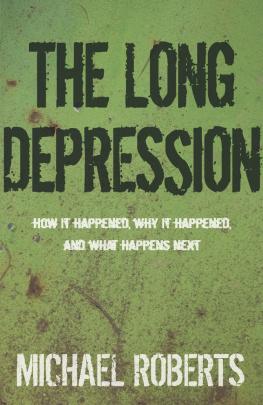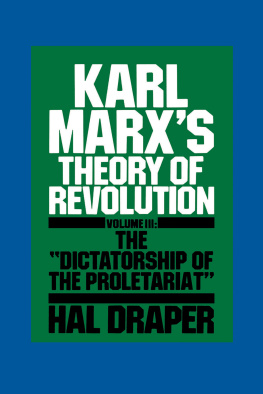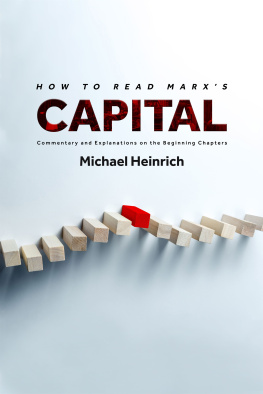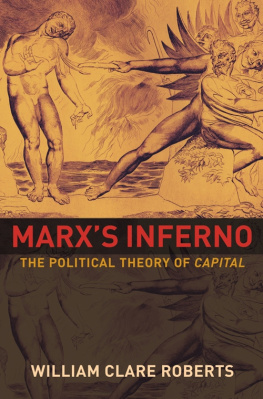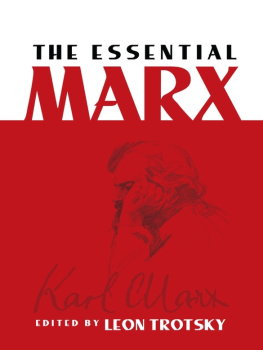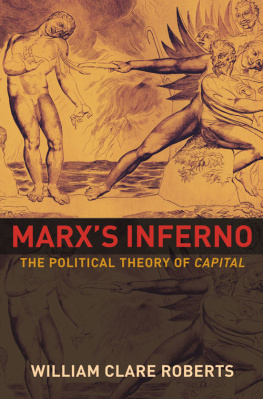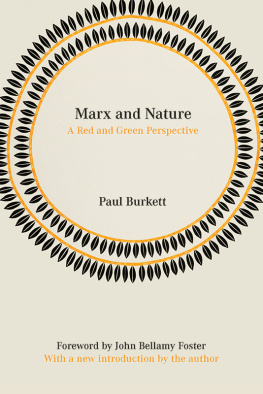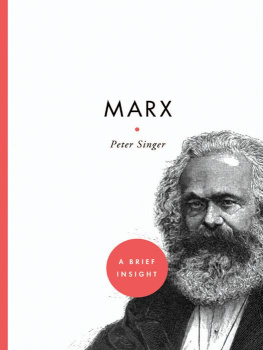Michael Roberts - Marx 200: A review of Marxs economics 200 years after his birth
Here you can read online Michael Roberts - Marx 200: A review of Marxs economics 200 years after his birth full text of the book (entire story) in english for free. Download pdf and epub, get meaning, cover and reviews about this ebook. year: 2018, publisher: lulu.com, genre: Romance novel. Description of the work, (preface) as well as reviews are available. Best literature library LitArk.com created for fans of good reading and offers a wide selection of genres:
Romance novel
Science fiction
Adventure
Detective
Science
History
Home and family
Prose
Art
Politics
Computer
Non-fiction
Religion
Business
Children
Humor
Choose a favorite category and find really read worthwhile books. Enjoy immersion in the world of imagination, feel the emotions of the characters or learn something new for yourself, make an fascinating discovery.
- Book:Marx 200: A review of Marxs economics 200 years after his birth
- Author:
- Publisher:lulu.com
- Genre:
- Year:2018
- Rating:4 / 5
- Favourites:Add to favourites
- Your mark:
- 80
- 1
- 2
- 3
- 4
- 5
Marx 200: A review of Marxs economics 200 years after his birth: summary, description and annotation
We offer to read an annotation, description, summary or preface (depends on what the author of the book "Marx 200: A review of Marxs economics 200 years after his birth" wrote himself). If you haven't found the necessary information about the book — write in the comments, we will try to find it.
Marx 200: A review of Marxs economics 200 years after his birth — read online for free the complete book (whole text) full work
Below is the text of the book, divided by pages. System saving the place of the last page read, allows you to conveniently read the book "Marx 200: A review of Marxs economics 200 years after his birth" online for free, without having to search again every time where you left off. Put a bookmark, and you can go to the page where you finished reading at any time.
Font size:
Interval:
Bookmark:
a review of Marxs economics 200 years after his birth
Marx 200
a review of Marxs economics 200 years after his birth
Michael Roberts 2018
Graphic design: Eva Kinch Hall, Ordered by Colour Published and printed by Lulu.com
Printed in London, UK 2018 ISBN: 978-0-244-07625-2
Marx 200
a review of Marxs economics years after his birth
Michael Roberts
Contents
The law of value
The law of accumulation
The law of the tendency of the rate of profit to fall
Tendencies and countertendencies
Crises and finance
Both cyclical and secular
Alternative Marxist theories of crises
The modern critics
Marxs law of value: the so-called transformation problem
Marxs law of value: two sources of profit?
Marxs law of profitability: correcting Marx
The Keynesian critique
Marx versus Keynes/Kalecki: the theory of crises
The Keynesian and Marxist multipliers
Marx, Keynes and the labour movement
Inequality is inherent in capitalism
Imperialism is a product of capitalism
Capitalism will destroy the planet
The inexorable rise of the machines
The class struggle will continue
This short book concentrates on explaining Marxs economic ideas and their relevance to modern economies 200 years after his birth. Marx developed three key laws of motion of capitalism, around which a clear analysis of the nature of modern economies can be understood.
From these laws, we can understand why capitalism cannot escape being subject to regular and recurring slumps; causes vicious rivalry among national states that leads to perpetual wars; and engenders uncontrolled and wasteful use of natural resources that now threatens the destruction of the planet itself.
Marxs laws also tell us that capitalism is not here for eternity but has a finite existence. The question before us, years after Marxs birth, is what would replace it as a mode of production and social organisation for human beings on this planet.
The development of Marxs economic thought can be divided into four parts: his childhood; as a young man; as a mature man; and the old Marx.
In his teenage years, he was under the influence of his father and his fathers friend, Baron Von Westphalen. They were both men of the enlightenment, followers of the ideals of the French philosophers and revolution. Marx was born just after the end of the so-called Napoleonic wars and at the start of a gradual economic recovery in the petty German statelets. When Marx went to university in the late 1830s, he was a radical democrat in opinion, one of the Young Hegelians, who were philosophically opposed to religious superstition and autocracy.
The period of Marx as a young man from the point of him leaving university and without an academic post was one of radical upsurge in ideas and political action in Europe. Britain was in the midst of the industrial revolution with all its expansion of machinery and goods and the accompanying dark exploitation of labour. The Reform Act of 1832 had given the middle classes the vote but now there was pres- sure from the Chartist working class movement for full franchise. In Germany, workers in the towns were organising for the first time and peasants in country were growing restive. Economically, in 1840 there was the establishment of the German Customs Union, the Zollverein, which brought an end to trade barriers within the Prussian sphere of influence and began a huge economic upsurge.
On leaving university, Marx became a radical journalist with a grow ing materialist conception of class struggle. Marx started to take an interest in economic developments under the encouragement of his new and eventually lifetime friend, Friedrich Engels. Engels lived in the heart of Capital, Britains industrial Manchester, and was already writing on the economic and social consequences of capitalist development. Marx and Engels became communists, an ideology designed to replace capitalism as a mode of production and social organisation with communal control, with the working class as the gravediggers of capitalism to deliver this. They wrote the Communist Manifesto in March 1848, just before the outbreak of the revolutions against autocracy across Europe. The manifesto intuitively recognised the nature of capitalism, but without expoun ding any economic laws of motion.
The defeat of the 1848 revolutions and Marxs eventual exile to Britain began the period of mature Marx (aged 32) that lasted until the defeat of the Paris Commune in 1871 (aged 53). This turned out to be the period of the long boom in the European economies. Britain was the dominant economic and political power and thus the best placed to study the economics of capitalism. The boom revealed to Marx and Engels that there was no short cut to revolution and capitalism still had some way to go in its spread across the globe. The first international slump in 1857 did not lead to the collapse of capitalism or to revolution. Marx concentrated on organising the first international party of the working class (the International Working Mens Association) and on writing his main economic work, Capital.
The defeat of the Paris Commune in 1871, followed by the financial panic and crash of 1873 in the US, which spread to Europe, set the final phase of Marxs life. It was also the start of what was eventually called the (first) Great Depression, where the major capitalist economies struggled to recover from crashes and became subject to a series of slumps. This was a vindication of Marxs laws of motion. Marx died in 1883, in the depth of the latest slump in Britain.
Marx remained an obscure figure in economic and political thought after his death, except in the circles of the leaders of the burgeoning social democratic parties of Europe after the Great Depression came to an end. In this new period of economic recovery of the 1890s, unskilled workers formed trade unions and working class organisations built mass political parties with increasing voting power. Marxs ideas now became more widespread. The victory of the Bolshevik (majority) social democrats in the Russian revolution in 1917 then placed the works of Marx and Engels on the world stage through the 20th century.
This book will look back at Marxs economic ideas and see just how relevant they are for 21st century.
CHAPTER ONE
Karl Heinrich Marx was born in Trier, Germany, which was part of the Prussian monarchical state. Marx was from a Jewish family that converted to Protestantism during his childhood. His childhood sweetheart was Jenny Von Westphalen (whom he was later to marry). She was the daughter of the local squire or aristocrat, Baron von Westphalen. He and Marxs father were friends, as both were influenced by the enlightenment ideas purveying France and Germany at that time. Karl got his initial liberal leanings from the discussions and books provided by the two. Marxs birthplace was in Bruckenstrasse 10, in Trier. The family

Marxs birthplace in Trier
occupied two rooms on the ground floor and three on the first floor. It was purcha sed by the Social Democratic Party of Germany in 1928 and it now houses a museum devoted to him.
Marx studied philosophy in the Universities of Bonn, Berlin and Jena from where he gained a doctorate in philosophy at the age of 23. As a student, he was involved in circles of young philosophers known as the Young Hegelians. He worked as a journalist and editor for the influential newspaper Rheinische Zeitung of Cologne. At this time, he was a radical liberal, not a socialist. But the radical perspective of the newspaper led the Prussian authorities initially to censor and later close down the newspaper and to the exile of Marx. He took refuge in France and settled in Paris, where he had the opportunity to study French utopian socialism. He became a communist, as it was called.
Font size:
Interval:
Bookmark:
Similar books «Marx 200: A review of Marxs economics 200 years after his birth»
Look at similar books to Marx 200: A review of Marxs economics 200 years after his birth. We have selected literature similar in name and meaning in the hope of providing readers with more options to find new, interesting, not yet read works.
Discussion, reviews of the book Marx 200: A review of Marxs economics 200 years after his birth and just readers' own opinions. Leave your comments, write what you think about the work, its meaning or the main characters. Specify what exactly you liked and what you didn't like, and why you think so.


